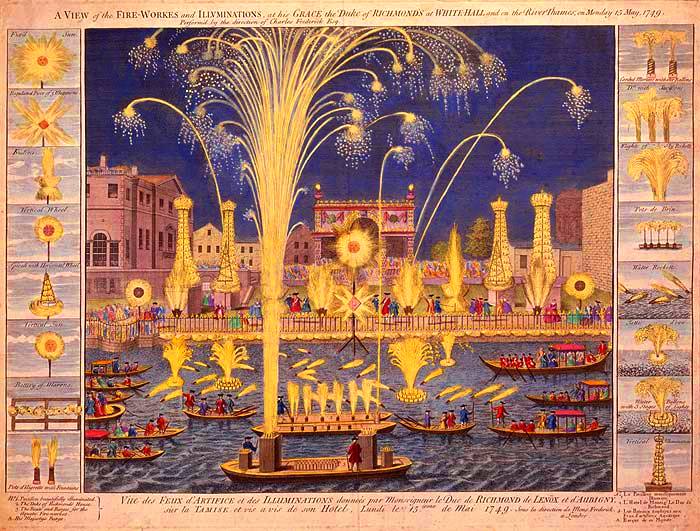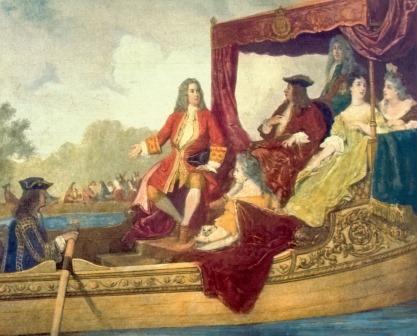Well, I have no shortage of recordings of this, one of the most popular works of baroque music. I have performances conducted by Fennell, Gardiner, Hogwood, Marriner, Maier, Pinnock, Savall, Stokowski, and Warchal, and I’ve probably heard a dozen others. Most listeners divide them into two categories: 1) recordings using original period instruments, or an approximation thereof; 2) recordings using twentieth century instruments in a standard concert format. I’m not going to sneer at the latter group. Handel was as pragmatic a showman as music ever produced, and he would have been perfectly happy hearing Stokowski’s wonderful and totally inauthentic version, though he might have told Marriner to give his performance a little more zetz. But on the whole, I prefer the period instrument versions, and of those, I’d pick Jordi Savall’s for my desert island music collection. This version has zetz-aplenty.
Handel actually produced two very specific versions. One was for 24 oboes, 12 bassoons and a contrabassoon, nine natural trumpets, nine natural horns, three pairs of kettledrums, and side drums playing ad libitum. This was the one intended for the original outdoor performance on April 27, 1749, in a London park south of the Thames, to accompany the fireworks celebrating the end of the War of Austrian Succession and the signing of the Treaty of Aix-la-Chapelle. Despite the rain, and the dampened fireworks setting fire to part of the pavilion, it was a popular success, and caused a three hour traffic jam on the London Bridge. This was the noisy, dirty, exuberant London of which Samuel Johnson said “You find no man, at all intellectual, who is willing to leave London. No, Sir, when a man is tired of London, he is tired of life; for there is in London all that life can afford.” The music captures this mood exactly. The producers had cautioned Handel that the King did not like stringed instruments, so he grudgingly omitted them. For a later, indoor performance, Handel changed the arrangement to add violins, violas, cellos and double basses. Modern performances, whether on “authentic” instruments or not, usually use this version. But Handel seldom had to kowtow, as most composers did, to the demands of aristocratic patronage. He was the first composer to build a genuinely commercial and popular music business, answering to the tastes of London’s cosmopolitan public and not to church and court. His operas and oratorios, for example, where often on Old Testament themes because they could appeal to both Christian and Jewish audiences.
This was one of the first works of baroque music that I heard as a child, and I was mesmerized by the catchy melodies, and the way the various instrumental parts called and answered each other, and wove together like the snakes in a celtic orm. After countless hearings, it still gives me pleasure.
If you would like to see a rather quaint tribute to Handel, dig up the 1942 Rank Studios biopic The Great Mr. Handel, directed by Norman Walker and starring William Lawson.


0 Comments.